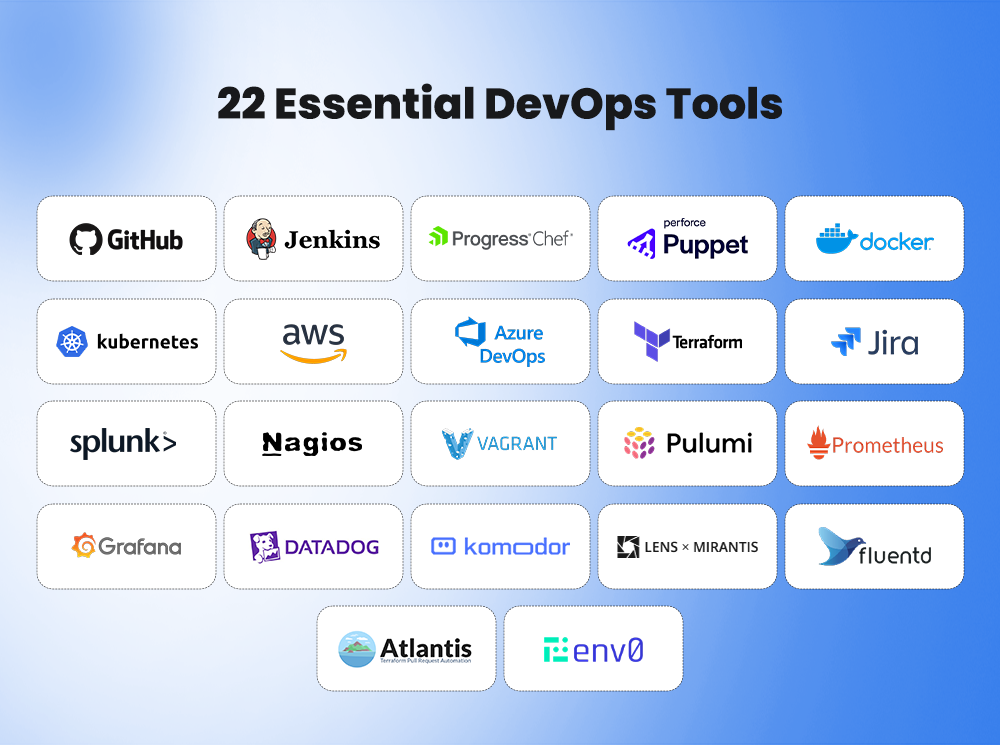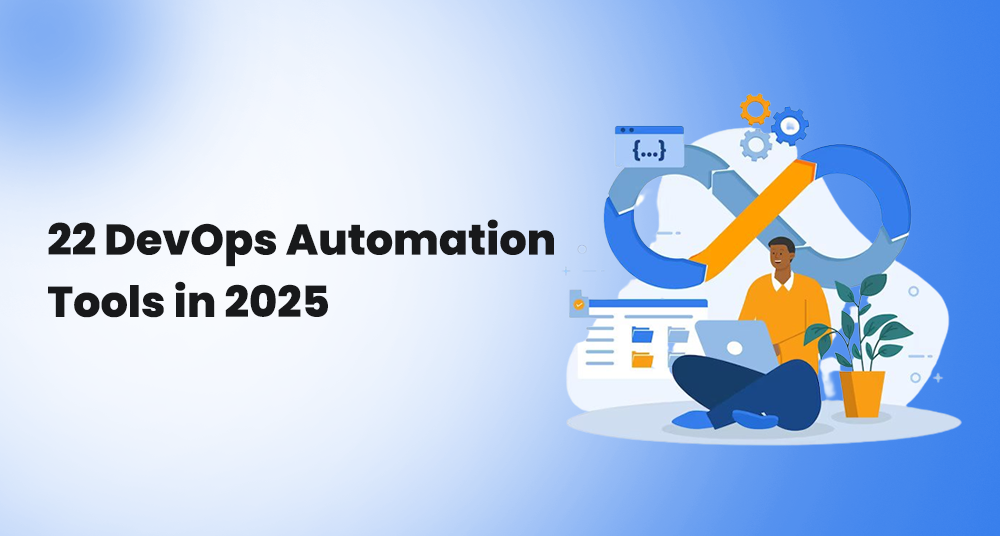In today’s fast-paced software development environment, DevOps has emerged as a crucial practice for aligning development and operations teams to deliver software faster and more efficiently. DevOps focuses on streamlining and automating the processes involved in software development and IT operations, allowing teams to build, test, and deploy code more rapidly. As part of this shift, there has been a surge in the development of DevOps tools designed to enhance productivity, improve collaboration, and automate key aspects of the software development lifecycle (SDLC).
In this article, we will explore the top 22 DevOps tools that are essential for automation, and how they can help engineers streamline their workflows. Whether you’re new to DevOps or a seasoned professional, these tools can significantly enhance your workflow and automate many of the tasks that traditionally slow down software development and deployment.
Core Components of DevOps
To truly appreciate the value of DevOps Tools, it’s essential to understand the core components of a successful DevOps pipeline:
Continuous Integration (CI)
CI ensures that code changes are automatically integrated into the main codebase frequently, reducing integration problems and ensuring faster development cycles.
Continuous Delivery (CD)
CD focuses on automating the deployment process, making it possible to release code to production with minimal manual intervention.
Configuration Management
Configuration Management (CM) is an essential part of DevOps that ensures the consistency and stability of the infrastructure.
Infrastructure as Code (IaC)
IaC allows teams to manage and provision infrastructure using code, enabling easy scaling and efficient management of resources.
Monitoring & Logging
Monitoring the system and application performance is critical for identifying issues before they affect users. Logging provides insights into the system’s health and enables troubleshooting.
Collaboration
One of the most critical components is fostering communication and collaboration between developers, operations, and other stakeholders.
Top Features of DevOps
DevOps isn’t just a buzzword; it’s a culture powered by automation and collaboration. Here are the key features that DevOps Tools support:
- Speed: Faster time to market through CI/CD pipelines.
- Reliability: Frequent, small updates that are easier to test and roll back.
- Scalability: Handle increased workloads and infrastructure growth with ease.
- Security: Early detection of vulnerabilities through automated checks.
- Efficiency: Elimination of manual processes and repetitive tasks.
Best DevOps Tools to Streamline Your Workflow in 2025

GitHub
A cornerstone of source code management, GitHub provides collaborative features such as pull requests, issue tracking, and GitHub Actions for CI/CD automation. It’s the go-to platform for open-source and enterprise development teams alike.
Jenkins
Jenkins is an open-source automation server ideal for CI/CD pipelines. It supports hundreds of plugins, integrates with almost every DevOps tools, and helps automate testing, deployment, and more.
Chef
Chef is a powerful configuration management tool that automates infrastructure provisioning using Ruby-based DSL. It ensures consistency across environments and enables efficient infrastructure scaling.
Puppet
Puppet automates configuration management and system administration. It’s agent-based and works well in large infrastructure settings. Puppet’s declarative language makes managing resources intuitive.
Docker
Docker revolutionized containerization by enabling developers to package applications and their dependencies into containers. Containers provide portability and consistency across different environments, making Docker an essential tool in any DevOps pipeline.
Kubernetes
Kubernetes is a powerful container orchestration platform that automates the deployment, scaling, and management of containerized applications. It ensures that applications run smoothly, even as traffic or system demands grow, making it a must-have tool in modern DevOps pipelines.
AWS Cloud Computing
Amazon Web Services (AWS) offers an extensive suite of cloud services. Tools like AWS CodePipeline and AWS CloudFormation help engineers implement scalable CI/CD pipelines and IaC solutions.
Azure DevOps
Microsoft’s Azure DevOps offers end-to-end development lifecycle tools including Azure Pipelines, Repos, Artifacts, Boards, and Test Plans. It’s ideal for both cloud and on-prem deployments.
Terraform
Developed by HashiCorp, Terraform is an IaC tool that enables you to define and provision infrastructure across various cloud platforms using a simple configuration language (HCL).
Jira
Popular among Agile teams, Jira supports project planning, task management, and issue tracking. It integrates well with CI/CD pipelines and is often used alongside Confluence for documentation.
Splunk
Splunk offers powerful log management and analytics. It helps DevOps teams monitor application logs, gain operational intelligence, and resolve issues faster with its real-time dashboards.
Nagios
Nagios is an open-source monitoring tool that tracks system health, server performance, and network activity. It’s known for its alerting system and plugin support for different checks.
Vagrant
Vagrant simplifies the setup of development environments using virtual machines. It ensures consistency between development, staging, and production by creating reproducible environments.
Pulumi
Pulumi is an emerging IaC tool that supports familiar programming languages like JavaScript, Python, and Go. It helps developers manage infrastructure on cloud platforms using real code.
Prometheus
Prometheus is an open-source monitoring and alerting toolkit, widely used for time-series data. It’s especially useful in Kubernetes environments and integrates seamlessly with Grafana.
Grafana
Grafana is an open-source visualization tool that integrates seamlessly with Prometheus to visualize metrics in real-time. Grafana dashboards provide insights into system performance, making it a key tool for monitoring and observability.
Datadog
Datadog provides cloud-scale monitoring for applications, servers, and databases. It combines metrics, traces, and logs into a unified platform for end-to-end visibility.
Komodor
Komodor is designed for Kubernetes troubleshooting. It simplifies debugging by providing a clear view of what changed, when, and how it impacted the system.
Lens
Lens is an IDE for Kubernetes that provides a full dashboard to manage clusters. It helps DevOps engineers observe workloads, resources, and logs in real time.
Fluentd
A unified logging layer, Fluentd collects logs from multiple sources and routes them to different endpoints like Elasticsearch or S3. It’s lightweight and flexible for log management.
Atlantis
Atlantis is an open-source tool that automates Terraform workflows and enhances collaboration between developers and operations teams. It integrates with version control systems and enables teams to collaborate on infrastructure changes using pull requests.
Env0
Env0 is an IaC automation platform that allows teams to manage Terraform, Terragrunt, and other tools at scale. It supports policy-as-code, role-based access, and usage controls.
How do DevOps Tools Help Us?
DevOps Tools are not just about automation—they’re enablers of speed, collaboration, and resilience. Here’s how they make a difference:
- Accelerated Delivery: Automating testing, building, and deployment processes allows for faster delivery of software features.
- Improved Collaboration: Tools like GitHub, Jira, and Azure DevOps enhance communication between developers, testers, and operations teams.
- Reduced Downtime: Monitoring tools like Prometheus and Datadog proactively alert teams before small issues turn into big outages.
- Enhanced Quality: CI/CD tools catch bugs early and enforce coding standards through automated pipelines.
- Cost Efficiency: By automating repetitive tasks, teams can focus on innovation rather than maintenance.
The use of DevOps Tools enables organizations to shift from reactive to proactive workflows, making development more predictable and less chaotic.
Closing Lines
In 2025, DevOps is no longer optional—it’s essential. The integration of automation, continuous delivery, and agile operations defines modern software development. These top 22 DevOps Tools provide a robust foundation for engineers looking to enhance productivity, reduce errors, and scale efficiently. From containerization with Docker and Kubernetes to monitoring with Grafana and Prometheus, and IaC with Terraform and Pulumi, every tool on this list serves a strategic purpose.
By leveraging these DevOps Tools, engineers can stay ahead of the curve, ship faster, and innovate more confidently. Explore, implement, and transform your workflow with the tools that power the world’s best engineering teams.
Useful Resource: DevOps Roadmap for Software Development






What do you think?
It is nice to know your opinion. Leave a comment.